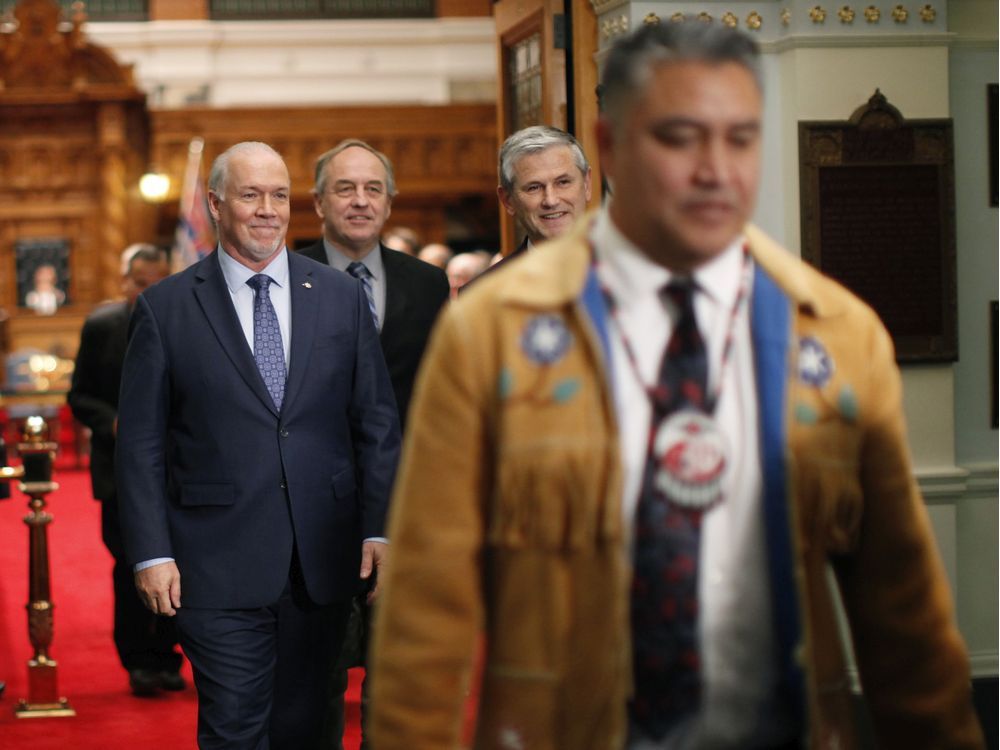Vaughn Palmer: Upbeat over shared values, but difficult work on UNDRIP still to come

Credit to Author: Gord Kurenoff| Date: Wed, 06 Nov 2019 01:25:08 +0000
VICTORIA — When Premier John Horgan and his cabinet gathered in Vancouver Tuesday for their annual summit with First Nations, they began by noting how they’d kept the promises made at last year’s session.
At the November 2018 meeting, the New Democrats pledged to implement the UN Declaration on the Rights of Indigenous Peoples and to begin sharing gambling revenues with First Nations for the first time.
“I’m particularly excited about this year’s gathering,” Horgan told reporters Tuesday, “because it falls on the recent introduction of legislation that would enshrine the UNDRIP into law here in B.C. — the first province in the country to do so.”
Next up in the speaking order at the press conference was Scott Fraser, minister of Indigenous relations and reconciliation, with a boast of his own.
“Very recently, eligible First Nations started receiving new shared revenues,” he noted, underscoring the first $70 million payout from provincial gambling revenues.
“A bill just passed in the legislature paves the way for a long-term agreement worth $100 million a year. Nearly $3 billion will be shared with First Nations by 2045.”
The First Nations revenue sharing partnership is in line to receive seven per cent of gambling revenues. Some 170 of the province’s 200 First Nations have already joined, putting them in line for an annual share based on population and other considerations.
With the New Democrats having delivered those results over the past year, First Nations representatives were upbeat about this year’s gathering as well.
Even Grand Chief Stewart Phillip, usually the most skeptical and outspoken of the leaders, was caught up in the mood.
“We are incredibly optimistic to be engaged in joint work with the provincial government that is going to make change on the ground,” he said, via the opening press day release.
But Phillips, who has joined many a protest over the years, also added that First Nations would of course “continue to defend and implement Indigenous title and rights in the courts and in the streets.”
Horgan told reporters he hoped “we will be talking about our shared values rather than the issues that divide us.
“To bring forward the UNDRIP, for example, was something that was not just done by our government. It was done in concert, in co-operation, in collaboration with (First) Nations right across the province.”
Fraser echoed the hope that the UNDRIP legislation would provide a starting point for this year’s meetings as well: “It gives us a path forward, creating further clarity and predictability for everyone.”
This year marks the sixth annual meeting between the provincial cabinet and the First Nations Leadership Council, itself made up of the three main groups representing Indigenous people in B.C.: the First Nations Summit, the Assembly of First Nations and the Union of B.C. Indian Chiefs.
Though the gatherings began under the previous government of Premier Christy Clark, they have loomed larger in importance since the New Democrats took power, particularly given Horgan’s endorsement of UN Declaration.
This year the New Democrats dropped an entire week from the fall schedule of the legislature to clear the way for the premier, cabinet and other MLAs to attend this week’s gathering in Vancouver.
Some 900 delegates, representing almost all of the province’s 200 First Nations, are registered to attend the two days of sessions, ending Wednesday.
The schedule is top heavy with meetings between individual cabinet ministers and representatives of First Nations. More than 600 were slotted in according to Fraser. Horgan himself was set down for 32 over the two days.
After last year’s commitment to the revenue sharing and the UN declaration, this year’s gathering is dedicated to getting started on the nuts and bolts task of implementing the UNDRIP legislation.
“The next step is an action plan developed in consultation and collaboration with Indigenous peoples,” said Fraser. “During the next two days, we will have many conversations about how to put this historic legislation into action across the province.”
Horgan echoed some words from Grand Chief Phillip that “the hard work begins with the action plan — again, we’ll be developing that together as we did the legislation.”
The legislation itself is pretty much a blank slate when it comes to the details of the plan.
It simply says the “government must prepare and implement an action plan to achieve the objectives of the UN declaration. This to be done in consultation and co-operation with the Indigenous peoples in British Columbia.”
No dates, deadlines or timetable. But the plan itself “must contain the date on or before which the government must initiate a review of the plan.”
Once there is a plan, the minister must table it in the legislature. And as if that were not sufficient leeway, the legislation further empowers the government “to prepare a new action plan” if needed.
Plus there is also this: “For the purposes of implementing this legislation, the government must consider the diversity of the Indigenous peoples in B.C., particularly the distinct languages, cultures, customs, practices, rights, legal traditions, institutions, governance structures, relationships to territories and knowledge systems of the Indigenous peoples in B.C.”
If that sounds like it might entail years of hard work, you’d not be far wrong in my estimation.
But if the UNDRIP legislation is going to have more than symbolic importance, it will depend on the substance and success of the action plan.
CLICK HERE to report a typo.
Is there more to this story? We’d like to hear from you about this or any other stories you think we should know about. Email vantips@postmedia.com